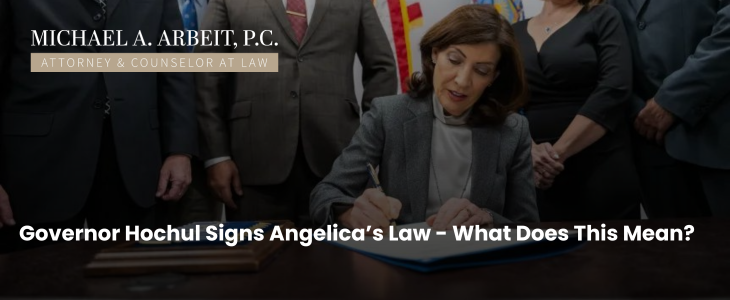In 2008, an unlicensed driver with seven prior license suspensions ran a red light in Long Island and killed 14-year-old Angelica Nappi. Because of the way the laws were written at the time, the driver only faced a misdemeanor. Angelica’s Law, which went into effect in 2024, strengthened the state’s laws against reckless drivers.
It is now easier for high-risk drivers to face felony rather than misdemeanor charges for driving without a license. This means that every motorist should be particularly mindful of their ability to legally operate a motor vehicle before they get behind the wheel. Angelica’s Law also affects the nature of criminal defense strategies that lawyers can use for their clients.
Are you facing felony charges for unlicensed driving? If so, it is imperative that you retain knowledgeable legal counsel to advocate for you and seek the best possible outcome of your case. Find out why so many New York drivers trust the experience of Michael A. Arbeit, P.C.
The Basics of Angelica’s Law
The law named in honor of Angelica Nappi provides much stiffer penalties for drivers who have repeated driver license suspensions. Angelica’s Law lowers the threshold for first-degree aggravated unlicensed operation (AUO) of a motor vehicle from ten down to five suspensions. Because this offense is a class E felony, the law effectively makes it easier to charge an unlicensed driver with a felony.
Any New York driver who operates a vehicle with five or more license suspensions will no longer be charged with a misdemeanor, as under previous law, but with a felony. This allows the courts to crack down on drivers who have repeated suspensions by imposing much higher fines and possible jail time earlier in a driver’s history of traffic violations. Put simply, the new law is designed to send the message that unlicensed driving will not be tolerated.
The law includes a notification requirement. If a driver has their license suspended four times, the New York DMV will send them a notice warning them that a fifth offense for unlicensed operation of a vehicle will be charged as a felony.
What Are the Penalties for Violating Angelica’s Law?
The new law is intended to more severely punish drivers who are convicted of AUO much earlier than they would have otherwise been. A driver who violates Angelica’s Law could face a fine of between $500 and $5,000, plus up to two years in prison. This is to say nothing of secondary repercussions such as higher automobile insurance premiums.
How to Defend Against Charges Related to Angelica’s Law
It’s no secret that the new law is meant to harshly punish New York drivers who operate their vehicles without a valid license and make it easier to keep these motorists off the road. However, it’s important to understand that while attorneys may need to adjust their defense strategies in light of Angelica’s Law, a criminal charge (even of a felony) is not the same thing as a conviction. Regardless of the legal circumstances facing you or the number of prior license suspensions you have, you have the right to retain legal counsel and defend yourself.
It’s important for drivers to understand that they can be convicted of AUO even if they did not know their license was suspended when they were stopped by law enforcement. It is enough that the driver has reason to know their license is suspended. For this reason, any driver who is unsure about the status of their license should not wait until receiving a notification letter but should instead contact the New York DMV to check.
In light of this, we recommend that you do not make any statements to the police that may give them a reason to believe you either knew or should have known your license is suspended. Apologizing in any way can be construed as an admission, and admitting to the number of prior convictions will also make it easier to charge you with AUO. The safest step you can take is to not make any statements to law enforcement, but instead ask to speak with a New York criminal defense attorney.
Possible ways to defend against AUO include:
- No evidence that the driver knew or had reason to know of the license suspension: As mentioned above, if the prosecution cannot prove you knew or should have known that you did not have a valid driver license, it will be more difficult for them to make their case. The prosecution must prove their case beyond a reasonable doubt.
- Failure to receive written notice: The DMV should send a notice to a driver once they reach four suspensions. Although the failure of the DMV to mail this notice (or mail it to the correct person or individual) does not necessarily mean the driver had no reason to know of the suspension, it does make the prosecution’s job more difficult.
- Inadmissible statements and evidence: To try to prove that the driver knew or had reason to know their license was suspended, the prosecution may attempt to introduce statements or evidence that is unreliable or inadmissible in court. We scrutinize the prosecution closely and challenge any attempt to admit evidence that violates the rules.
It also may be possible to argue for reduced penalties and jail time, and otherwise for leniency, depending on the unique circumstances of your case.
Contact Our New York Angelica’s Law Attorney
No matter the circumstances surrounding your charges, let the team at Michael A. Arbeit evaluate the facts in your case and get to work developing a personalized legal strategy. Call or contact us online today to get started on your defense.
